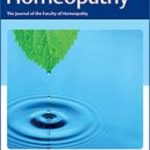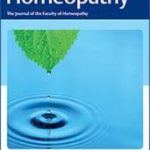Double-Blind, Randomized, Placebo-Controlled Trial of Individualized Homeopathic Medicines in Atopic Dermatitis in Adults: A Replication Trial with 6 Months' Follow-up

Background Atopic dermatitis (AD) is a chronic relapsing and remitting inflammatory skin disease that can have a significant impact on quality of life. During the last four decades, a rising trend in AD has been observed in India. Homeopathic medicines are claimed to be beneficial in AD; however, convincing research evidence has been lacking. We compared the efficacy of individualized homeopathic medicines (IHMs) against placebos in the treatment of AD. Methods In this double-blind, randomized, placebo-controlled trial of 6 months’ duration (n = 60), adult patients were randomized to receive either IHMs (n = 30) or identical-looking placebos (n = 30). All participants received concomitant conventional care, which included the application of olive oil and maintaining local hygiene. The primary outcome measure was disease severity using the Patient-Oriented Scoring of Atopic Dermatitis (PO-SCORAD) scale; secondary outcomes were the Atopic Dermatitis Burden Scale for Adults (ADBSA) and Dermatological Life Quality Index (DLQI) – all were measured at baseline and every month, up to 6 months. Group differences were calculated on the intention-to-treat sample. Results After 6 months of intervention, inter-group differences became statistically significant on PO-SCORAD, the primary outcome (−18.1; 95% confidence interval, −24.0 to −12.2), favoring IHMs against placebos (F 1, 52 = 14.735; p <0.001; two-way repeated measures analysis of variance). Inter-group differences for the secondary outcomes favored homeopathy, but were overall statistically non-significant (ADBSA: F 1, 52 = 0.019; p = 0.891; DLQI: F 1, 52 = 0.692; p = 0.409). Conclusion IHMs performed significantly better than placebos in reducing the severity of AD in adults, though the medicines had no overall significant impact on AD burden or DLQI.






Lascia un commento
Devi essere connesso per inviare un commento.